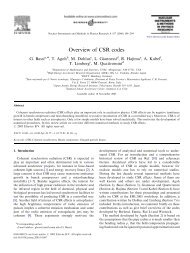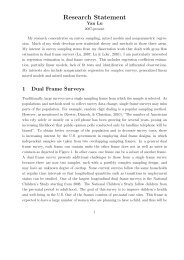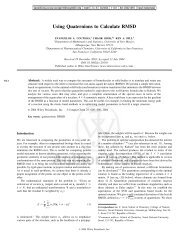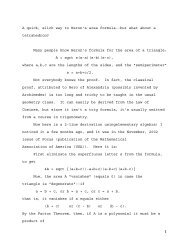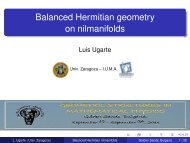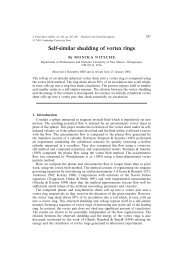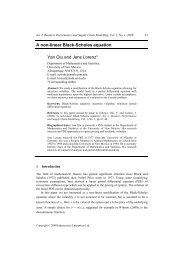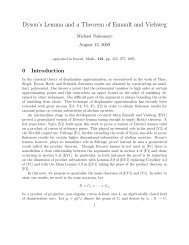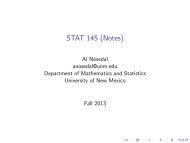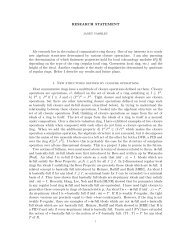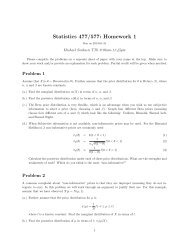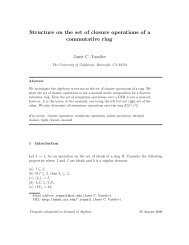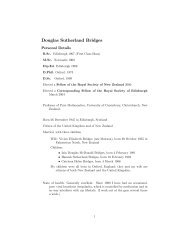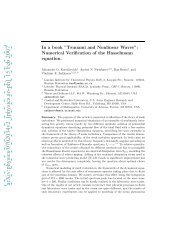OEO Office of Equal Opportunity - Department of Mathematics and ...
OEO Office of Equal Opportunity - Department of Mathematics and ...
OEO Office of Equal Opportunity - Department of Mathematics and ...
You also want an ePaper? Increase the reach of your titles
YUMPU automatically turns print PDFs into web optimized ePapers that Google loves.
134 ARTS AND SCIENCES<br />
educational excursion <strong>and</strong> research through Ghana-visiting<br />
Universities, small villages, slave castles, Dubois Research<br />
Center, etc. while interacting with the people. Students earn<br />
3-6 undergraduate or graduate credits.<br />
African American Studies (AFAM)<br />
101. Swahili I. (3)<br />
Foundation course for all beginning students interested in<br />
reading or speaking the language. {Offered upon dem<strong>and</strong>}<br />
102. Swahili II. (3)<br />
Foundation course for all beginning students interested in<br />
reading or speaking the language. {Offered upon dem<strong>and</strong>}<br />
103. Foundation <strong>of</strong> African-American Studies. (3)<br />
Okunor<br />
An exploration <strong>of</strong> the philosophical basis for the creation<br />
<strong>and</strong> the existence <strong>of</strong> African-American Studies program.<br />
{Fall, Spring}<br />
106. Elementary Arabic I. (3) Ali<br />
(Also <strong>of</strong>fered as MLNG 106.) A course in elementary modern<br />
st<strong>and</strong>ard Arabic.<br />
107. Elementary Arabic II. (3) Ali<br />
(Also <strong>of</strong>fered as MLNG 107.) A course for those with very<br />
minimal exposure to modern Arabic Language.<br />
115. Communication Across Cultures. (3)<br />
(Also <strong>of</strong>fered as CJ 115.) An introduction to communication<br />
among people from different cultural backgrounds, emphasizing<br />
intercultural relations. The class seeks to identify, honor<br />
<strong>and</strong> enhance the strengths <strong>of</strong> different cultural perspectives.<br />
206. Intermediate Arabic I. (1) Ali<br />
(Also <strong>of</strong>fered as MLNG 206.) The course covers the writing<br />
system, phonology, vocabulary, morphology <strong>and</strong> syntax<br />
structures <strong>of</strong> the Arabic language. Students will attend language<br />
laboratory to enhance their listening, comprehension<br />
<strong>and</strong> pronunciation skills.<br />
Prerequisites: 106 <strong>and</strong> 107. Restriction: permission <strong>of</strong> instructor.<br />
207. Intermediate Arabic II. (3) Ali<br />
(Also <strong>of</strong>fered as MLNG 207.) The course increases student’s<br />
reading, writing <strong>and</strong> speaking skills in Arabic including<br />
student’s knowledge <strong>of</strong> the writing system, the phonology, the<br />
vocabulary, the morphology <strong>and</strong> the syntax structures <strong>of</strong> the<br />
language. Language laboratory requirement is optional.<br />
Prerequisites: 206. Restriction: permission <strong>of</strong> instructor.<br />
250. Black Woman. (3) Fields<br />
(Also <strong>of</strong>fered as WMST 250.) A comprehensive survey <strong>of</strong><br />
the role the Black woman has played in the society <strong>of</strong> the<br />
United States. Emphasis will be placed on achievements <strong>and</strong><br />
contributions. {Fall}<br />
251. Black Books I. (3) Okunor<br />
(Also <strong>of</strong>fered as ENGL 281.) The course introduces students<br />
to the African American classics <strong>of</strong> the slavery era. Daily<br />
experiences <strong>of</strong> the characters in these books become the<br />
basis for discussing race, class, gender, revolt, freedom,<br />
peace <strong>and</strong> humanity.<br />
280. Black Experience in the United States. (3) Okunor,<br />
Williams<br />
(Also <strong>of</strong>fered as AMST 250.) An analysis <strong>of</strong> the political,<br />
economic, religious <strong>and</strong> familial organization <strong>of</strong> Black communities<br />
in the United States.<br />
284. African-American History I. (3) Williams<br />
(Also <strong>of</strong>fered as HIST 284.) A comprehensive survey <strong>of</strong> the<br />
story <strong>of</strong> African-Americans from pre-European days in Africa<br />
to the Civil War, U.S. {Fall}<br />
285. African-American History II. (3) Williams<br />
(Also <strong>of</strong>fered as HIST 285.) This course will explore each <strong>of</strong><br />
the major historical events, Black leaders <strong>of</strong> those times <strong>and</strong><br />
their influence on the social <strong>and</strong> political advancement <strong>of</strong><br />
African-American from the Civil War to the present. {Spring<br />
Restriction: permission <strong>of</strong> instructor.}<br />
294. Institutional Racism. (3) Herndon<br />
A study <strong>of</strong> the pervasive nature <strong>and</strong> the broad effects <strong>of</strong> raceinfluenced<br />
institutional decisions; the differences in the legal<br />
definition <strong>of</strong> institutional <strong>and</strong> individual racism.<br />
297. Interdisciplinary Topics. (1-3)<br />
Special topic courses in specialized areas <strong>of</strong> African-American<br />
Studies. Community Economic Development; Race <strong>and</strong><br />
American Law; Culture <strong>and</strong> Personality.<br />
299. Black Leaders in the U.S. (3) Malry, Shunkuri<br />
A comparative study <strong>of</strong> major African-American leaders <strong>and</strong><br />
their impact on race relations in the United States. {Spring}<br />
303. Introduction to Black Liberation <strong>and</strong> Religion. (3)<br />
Okunor<br />
(Also <strong>of</strong>fered as RELG 303.) Students will be introduced to<br />
the Black experience, which necessitates the redefinition<br />
<strong>of</strong> God <strong>and</strong> Jesus Christ in the lives <strong>of</strong> Black people as the<br />
struggle for transcendental <strong>and</strong> political freedom.<br />
307. Blacks in the U.S. West. (3) Williams<br />
(Also <strong>of</strong>fered as AMST 351.) A survey <strong>of</strong> the lives <strong>of</strong> Blacks in<br />
the American West (1528–1918).<br />
309. Black Politics. (3) Shunkuri<br />
(Also <strong>of</strong>fered as POLS 309.) A study <strong>of</strong> the history <strong>and</strong><br />
diverse educational <strong>and</strong> political maturation processes <strong>of</strong><br />
elected American <strong>of</strong>ficials <strong>and</strong> functions <strong>of</strong> the political process.<br />
{Fall}<br />
318. Civil Rights Politics <strong>and</strong> Legislation. (3) Shunkuri,<br />
Verhoeven<br />
(Also <strong>of</strong>fered as POLS 318.) An analysis <strong>of</strong> the dynamics<br />
<strong>of</strong> the major events, issues <strong>and</strong> actors in the civil rights<br />
movement (<strong>and</strong> legislations) in view <strong>of</strong> the theories <strong>of</strong> U.S.<br />
politics.<br />
Recommended prerequisite: 103.<br />
329. Introduction to African Politics. (3) Shunkuri<br />
(Also <strong>of</strong>fered as POLS 329.) An introductory course in the<br />
volatile politics in Africa. The various ideologies that underlie<br />
political movements <strong>and</strong> influence African governments will<br />
be explored.<br />
333. Black Political Theory. (3) Shunkuri<br />
Survey course <strong>of</strong> the literature <strong>and</strong> philosophy <strong>of</strong> the Black<br />
Diaspora.<br />
380. African Literature. (3) Ali<br />
An analytical look at the works <strong>of</strong> major African writers <strong>and</strong><br />
their usage <strong>of</strong> African symbols to portray Africa <strong>of</strong> the past,<br />
present <strong>and</strong> the future.<br />
381. Black Books II. (3) Okunor<br />
(Also <strong>of</strong>fered as ENGL 381.) This is the second phase <strong>of</strong> a<br />
three-part journey through the Black experience in search<br />
<strong>of</strong> humanity <strong>and</strong> peace. The vehicle is post-slavery books<br />
written by <strong>and</strong> about Black people. Issues raised <strong>and</strong> the<br />
characters in the books provide the occasion for in-depth<br />
discussion <strong>of</strong> inhumanity, protests, self definition, race relationships,<br />
liberalism, etc.<br />
382. Malcolm X. (3) Okunor<br />
The course allows the many voices <strong>of</strong> Malcolm X to speak<br />
through selected materials on Malcolm X. The materials<br />
become vehicles for discussing Malcolm’s <strong>and</strong> the many<br />
social, political <strong>and</strong> cultural issues the literature raises.<br />
385. The African World. (3) Shunkuri<br />
An interdisciplinary introduction to the study <strong>of</strong> Africa; its<br />
political <strong>and</strong> economic geographies; its traditional <strong>and</strong> new<br />
societies; <strong>and</strong> its politics in global perspectives.<br />
UNM CATALOG 2006–2007 Symbols, page 611.



